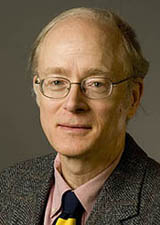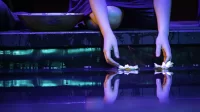Dennis Grafflin tries on 'Mao Jacket'
Campus reaction to Mao Jacket is a variant of what was expressed in the anonymous note that lay beside the sculpture until destroyed by rain: “Why is this man honored who killed so many of our men. Shame on our college.”
My guess is that if the piece were by a contemporary American sculptor, displayed a Western suit coat, and was titled George W. Bush, the near-universal reaction would be that representing the president as a rigid hollow metal shell was an act of savage critique.
Yet this work by contemporary Chinese artist Sui Jianguo has repeatedly been taken to be glorifying Mao in particular and communist rule in general, as if there could only be one Chinese thought pattern, irrevocably rooted in Marxism. My own suspicion is that, at this moment, it would be easier to find American artists praising George W. Bush without ironic intent than it would be to find Chinese artists wholeheartedly praising Mao Zedong.
Not surprisingly, it’s easier to perceive ambiguity in art that comes out of one’s own cultural background. Foreign political art, in particular, tends to be seen in terms of one’s own limited understanding of other people’s complications. When the sculpture stood in New York City, a critic asked angrily how it was different from displaying the jacket of a Waffen-SS officer, with the implication that such a display would be instantly stopped.
But what if the Nazi uniform sculpture bore the name of Anselm Kiefer, famous for a career built out of dark broodings on Germany’s poisonous modern history? Would that convert the sculpture into a horrific memorial warning, or would its straightforward representation still be inherently glorifying?
When Jasper Johns’ flag paintings are exhibited overseas, should they be equipped with warning labels reading, “May Not Be Simplistic Patriotic Statement,” to help out foreign viewers?
In the end, I’m inclined to think that if any significant percentage of the Bates student body actually looks hard at a piece of sculpture and develops personal opinions about it, that’s all good news.
By Dennis Grafflin
Professor of History Dennis Grafflin, the first permanent appointment in non-Western history, came to Bates in 1981.



